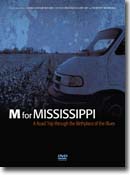 In the
Spring of 2008, Roger Stolle (of Cat Head Delta
Blues & Folk Art) and Jeff Konkel (of Broke & Hungry
Records) set out in Stolle’s Dodge van with
filmmaker Damien Blaylock and Kari Jones (of
Mudpuppy Recordings) on a journey to take in all the
Mississippi Delta Blues that they could hear in a
week. The group documented their journey and
recorded these artists using recording
engineer/guitarist Bill Abel’s Big Toe Porta-Studio
(a Volvo station wagon loaded with recording
equipment). The results of this expedition can be
seen and heard in the wonderful documentary, M
for Mississippi.
In the
Spring of 2008, Roger Stolle (of Cat Head Delta
Blues & Folk Art) and Jeff Konkel (of Broke & Hungry
Records) set out in Stolle’s Dodge van with
filmmaker Damien Blaylock and Kari Jones (of
Mudpuppy Recordings) on a journey to take in all the
Mississippi Delta Blues that they could hear in a
week. The group documented their journey and
recorded these artists using recording
engineer/guitarist Bill Abel’s Big Toe Porta-Studio
(a Volvo station wagon loaded with recording
equipment). The results of this expedition can be
seen and heard in the wonderful documentary, M
for Mississippi.
On Day
1, the journey begins at Stolle’s Cat Head store in
Clarksdale, where we hear one of the last of the
street blues musicians, Foster Wiley, AKA Mr. Tater
the Music Maker, who performs regularly in front of
the store for the tourists who pass through. Mr.
Tater’s joy and enthusiasm for the music comes
through loud and clear in his brief segment. Then,
it’s on to Ground Zero Blues Club to meet Terry
“Harmonica” Bean, who recounts how he got started in
the blues and how he developed his occasional
one-man-band sound under duress. He also discusses
the future of the blues in Mississippi. This
discussion is interspersed with Bean performing a
torrid one-man version of “I’m A Bluesman,” a
variation of John Lee Hooker’s “Boogie Chillen.”
Next,
the group picks up Wesley Jefferson at his home in
Clarksdale and they visit Stovall Farm, where
Jefferson worked as a youngster. Jefferson talks
about his early life working the cotton fields and
the juke joint his parents ran. The Do Drop Inn in
Shelby, MS is the setting for Jefferson and his band
as they perform the funky "The Wolves Are Howling,”
which benefits from a “Smokestack Lighting”-like
groove.
Day 2
takes the party to R. L. Boyce’s house in Como, MS,
where a house party is taking place during a
rainstorm, making recording difficult for Abel in
his Porta-Studio, which has wires running out of the
house through the rain into his Volvo. Boyce plays
with Lightnin’ Malcolm, performing his hypnotic
brand of Hill Country blues, and gives one of the
most hilarious, disjointed interviews ever seen.
Day 3
brings a fascinating visit with Pat Thomas, the son
of James “Son” Thomas, who has continued his
father’s unique brand of blues and folk art in
Leland, Mississippi. Thomas’ personality is almost
childlike as he eagerly shows off his collection of
collages cut out from magazines and books, along
with his drawings, paintings, and clay sculptures,
but he is transformed when he picks up his guitar
and sings, sounded reminiscent of his father on “The
Woman I Love.” The scene where he plays at his
father’s grave is especially poignant. From there,
it’s on Greenville, and the inimitable T-Model Ford,
who probably deserves a documentary of his own. Ford
talks about growing up, his past encounters with the
law, and his stormy relationship with his father. On
his song, “Hip Shakin’ Woman,” Ford plays
accompanied by his young grandson, Stud, on drums.
On Day
4, Stolle and Konkel travel to a clandestine
location to meet up with the Mississippi Marvel, the
mysterious bluesman who recorded a fine debut
release for Broke & Hungry earlier this year. Since
the Marvel wants his identity kept secret due to his
association with his church, he’s only filmed from
the neck down or with his face blocked out as he
plays the traditional tune, “Black Mattie’s Face,”
with Lightnin’ Malcolm. After leaving the Marvel,
it’s down US 49 to Bentonia, MS and the Blue Front
Café, stomping grounds of Jimmy “Duck” Holmes, who
talks about the café, which has been in his family
since 1948, his musical influences, and why he plays
the blues. Holmes’ musical contribution is an
original composition, “Slow Down, Slow Down,”
performed in the Bentonia blues tradition.
Day 5
brings a visit to Renova, MS and “Cadillac” John
Nolden, who plays with Bill Abel. Nolden plays
harmonica in a traditional Delta style and Abel
backs him with a cigar box guitar. Returning to
Clarksdale, the pair catches Robert “Bilbo” Walker
at Sarah’s Kitchen. Walker is a master showman known
for his flashy suits and wig, and his unique, highly
personalized take on cover tunes, and this one is no
exception, a deep soul version of Sam Cooke’s “Bring
It On Home To Me.” Walker also talks about how he
developed his Chuck Berry-style approach to
performing, including the Duck Walk, to liven up his
act.
The
pilgrimage continues on Day 6 back at Clarksdale at
Red’s Lounge, where Robert “Wolfman” Belfour is
holding court. Belfour discusses his past and his
philosophy on playing the blues, including the fact
that he doesn’t necessarily feel that you have to
“come up no hard way” to play the blues, laughing
that sometimes times are harder now for him than
they were then. He plays a subdued “Poor Boy, Long
Ways From Home.”
Finally,
the journey concludes on Day 7, as Konkel and Stolle
meet up with 80-year-old L. C. Ulmer in Taylor, MS
(near Oxford). Ulmer’s low-key vocal style and
melodic guitar brings to mind a plugged-in
Mississippi John Hurt and he plays a gentle tune
called “Rosalie,” which is one of the gems of the
soundtrack. Hopefully, we’ll get to hear more of him
soon.
Unlike
most blues documentaries, which seem to view their
subjects as if they’re part of a research paper or
maybe visitors from another planet, M for
Mississippi gives you a more personal look at each
of these musicians. You see their wisdom, their
humor, their idiosyncrasies, their friends and
neighbors around them, basically what makes these
guys tick. Konkel and Stolle come off more as
friends sharing a beer or a meal with them than as
interviewers and that gives the film a much more
personal feel and obviously made the musicians more
relaxed in their discussions.
Special
features on the DVD include some deleted scenes,
mini-biographies of the musicians and artists, and a
behind-the-scenes look at the production filmed by
Jones.
The
accompanying soundtrack features 11 songs from the
movie (a future volume will include more songs) and
serves as an excellent anthology or as an
introduction to the sound of today’s Mississippi
Delta blues. Belfour is the only one of the
principal subjects to not be included on the
soundtrack. The sound is excellent; especially
considering it was recorded in the back of a Volvo
station wagon under sometimes dire conditions.
M for
Mississippi is a joint production of Broke &
Hungry, Cat Head, and Mudpuppy. It’s also an
outstanding presentation of Mississippi blues the
way they are, warts and all. It’s fun, wild, and
unpredictable, just like the music itself. Go to
www.mformississippi.com to find out more about
this great project and grab a copy while you’re
there.
---
Graham Clarke
 Elvin
Bishop’s latest release, his first for the Delta
Groove label, is The Blues Rolls On. On his
new release, Bishop pays tribute to all of his
influences as well as a number of current standard
bearers, many of which stop by to lend a hand. Like
all Elvin Bishop’s albums, the end result is a
rollicking set of good-time blues that will put a
smile on your face and a hop in your step.
Elvin
Bishop’s latest release, his first for the Delta
Groove label, is The Blues Rolls On. On his
new release, Bishop pays tribute to all of his
influences as well as a number of current standard
bearers, many of which stop by to lend a hand. Like
all Elvin Bishop’s albums, the end result is a
rollicking set of good-time blues that will put a
smile on your face and a hop in your step.
The disc
kicks off with the title track, penned by Bishop,
which basically sets the theme of the disc, and
features him with Kim Wilson on harp and Warren
Haynes on guitar. John Nemeth and Angela Strehli
handle vocals on “Night Time,” Bishop’s nod to Ray
Charles. Nemeth is the unsung hero of the album,
providing razor-sharp vocals on this and two other
tracks. “Yonders Wall,” which Bishop originally
recorded with Paul Butterfield, was recorded on the
2007 Legendary R&B Cruise off Mexico and features
Ronnie Baker Brooks and the Tommy Castro Band, and a
remake of Bishop’s ’70s classic, “Struttin’ My
Stuff,” really catches fire with a funky arrangement
and the six-string interplay between Bishop, Haynes,
and Derek Trucks.
Bishop
sits down for a short, but lively discussion with B.
B. King before they tear into a swinging version of
Roy Brown’s “Keep A Dollar In Your Pocket.” “Who’s
The Fool,” a lost Motown treasure, features Bishop
on slide with Norwegian transplant Kid Andersen and
Mighty Mike Schermer taking turns at lead guitar.
Next, Bishop takes it down south to Louisiana with
R. C. Carrier and Andre Thierry for Clifton
Chenier’s Zydeco classic, “Black Gal,” before doing
a solo turn on his own autobiographical composition,
“Oklahoma.”
The
Homemade Jamz Band joins Bishop for a rousing take
on Junior Wells’ “Come On In This House.” Another
hidden gem, Wells’ “I Found Out,” features Nemeth
and Strehli on vocals and Chicago legend James
Cotton on harmonica, and Hound Dog Taylor was surely
smiling in Blues Heaven when he heard Bishop and
George Thorogood rip through “Send You Back To
Georgia.” The final cut, Jimmy Reed’s “Honest I Do,”
is an instrumental with Nemeth on harmonica.
Despite
the revolving door of guest stars, there’s an
underlying cohesiveness to the disc. This is
basically a group of the guys getting together to
play the music that they love and that is obvious
from the first note. I don’t think Elvin Bishop can
do it any other way.
---
Graham Clarke
 Rory
Block recently released a magnificent tribute
album to Robert Johnson, so it makes sense that she
would follow that release with a tribute disc to Son
House, who taught Johnson to play. Blues Walkin’
Like A Man (Stony Plain) features Block’s
interpretation of 13 of House’s songs. Block first
met House when she was a teenager, and she was
enthralled by the intensity and passion he brought
to his performances.
Rory
Block recently released a magnificent tribute
album to Robert Johnson, so it makes sense that she
would follow that release with a tribute disc to Son
House, who taught Johnson to play. Blues Walkin’
Like A Man (Stony Plain) features Block’s
interpretation of 13 of House’s songs. Block first
met House when she was a teenager, and she was
enthralled by the intensity and passion he brought
to his performances.
The
prospect of tackling Son House’s repertoire is a
daunting one at best, and a task that most
guitarists would not be up to, not so much on the
technical side, but on the performance side.
However, Block has been playing some of these songs
for over 40 years and is more than up to the task.
She succeeds on the instrumental side with powerful
renditions of “Preachin’ Blues,” “Jinx Blues,”
“County Farm Blues,” and “My Black Mama.”
Vocally,
while she can’t approach the raw passion of House’s
style (but then, how many really can?), she does a
fine job on tracks like “Grinnin’ In Your Face,”
“Shetland Pony Blues,” “Depot Blues,” and the moving
“I Want To Go Home On The Morning Train.”
On
“Death Letter,” Block really gets hits her stride.
The guitar work is appropriately fiery and her vocal
captures the despondent nature of the tune
perfectly.
Blues
Walkin’ Like A Man is a loving tribute by Rory
Block to a man who influenced her and countless
other blues guitarists to pick up the instrument.
It’s safe to say that she learned her lessons well
and made the most of them. If there’s justice in the
world, not only will this disc reap benefits for Ms.
Block, but it will also turn on a new generation of
blues fans to one of the most powerful and
influential blues guitarists ever.
---
Graham Clarke
 Come
Over Here! (Walkright Records) is John Earl
Walker’s fourth studio album and his best yet.
The veteran performer serves up a powerful set of
strong rockers and smooth blues that pick up where
his previous effort, People Are Talkin’, left
off. Come Over Here! includes ten powerhouse
tracks, all penned by Walker.
Come
Over Here! (Walkright Records) is John Earl
Walker’s fourth studio album and his best yet.
The veteran performer serves up a powerful set of
strong rockers and smooth blues that pick up where
his previous effort, People Are Talkin’, left
off. Come Over Here! includes ten powerhouse
tracks, all penned by Walker.
Highlights include “Tess’s Shuffle,” an instrumental
which features some great Texas-based guitar from
Walker. “The Showdown” is a hard rocker with an
infectious groove, and the title cut and “The
World’s A Prison” benefit from Walker’s guitar work
and Gene Cordew’s Hammond B3, while “Airport Blues”
is a terrific slow blues about a long distance love
affair.
“Backdoor Romance” cleverly updates a familiar blues
theme, and “Pretty Pretty Baby” sounds like a
long-lost ’50s tune. The subject matter to “Poor Boy
Blues” hits especially close to home for everyone,
given the current tough financial times. The closing
instrumental, “Nightwalker,” is four minutes of
guitar heaven.
Walker’s
regular band (Joey Tremelo – rhythm guitar, Peter
Harris – bass, Bobby Infante –drums, Gene Cordew –
Hammond B3, along with Tommy Keys on piano, and
Essie the Blues Lady, who duets with Walker on “My
Last Goodbye”) adds stellar backing on these tracks.
Most of them have been playing together for years
and there’s a strong sense of camaraderie.
It all
adds up to another winner for John Earl Walker, who
continues to dazzle and impress with every release.
---
Graham Clarke
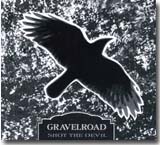 Gravel Road is a trio based in the state of
Washington that takes Delta Blues masters like RL
Burnside, Junior Kimbrough, T-Model Ford, and
Mississippi Fred McDowell as their muses. They
combine the droning, hypnotic sounds of these
bluesmen with the raw, grungy sounds of alternative
rock. Their songs deal with love, sex, murder,
death, and other worldly (and otherworldly) topics.
Shot The Devil (Uncle Larry’s Records) is
their second release.
Gravel Road is a trio based in the state of
Washington that takes Delta Blues masters like RL
Burnside, Junior Kimbrough, T-Model Ford, and
Mississippi Fred McDowell as their muses. They
combine the droning, hypnotic sounds of these
bluesmen with the raw, grungy sounds of alternative
rock. Their songs deal with love, sex, murder,
death, and other worldly (and otherworldly) topics.
Shot The Devil (Uncle Larry’s Records) is
their second release.
Few
bands have the onions to open their album with an
instrumental, but Gravel Road does just that with the
rough and ragged “Fred #3.” The title cut is another
standout and, well, let’s just say that you’ve
probably never heard anything like it before. Other
highlights include the acoustic number, “Sammy,”
another wild instrumental, “Hair Of The Dog,” and
the ominous “Taildragger.” “Forty-Four” is sort of a
third cousin to the old Howlin’ Wolf song, but with
some grunge and Hill Country guitar mixed in, and
“Lonely Nights” sounds like juiced-up Junior
Kimbrough.
Guitarist/vocalist Stefan Zillioux is as comfortable
with the droning Hill Country style (“Lonely
Nights,” “Taildragger”) as he is on the wild and
wooly stuff (“Hair of the Dog,” “Trainwreck”). His
menacing vocals are perfectly suited to the
material. Martin Reinsel (drums, percussion) and Jon
Kirby Newman (bass, guitar) provide rock-solid
rhythm support.
There
have been a lot of bands that have attempted to put
their own mark on the sounds of the North
Mississippi Hill Country Blues, but Gravel Road comes
closer to achieving that goal than most of the
others. Blues fans that are unafraid and willing to
try new directions will enjoy this one. Check out
the band at their website (www.gravelroadblues.com)
and look for the disc at
www.cdbaby.com.
---
Graham Clarke
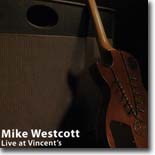 There
are times as an artist where it’s damn near
impossible to get your record reviewed. That’s the
case with my good friend Mike Westcott. He
gave me a copy of his record at the IBC in Memphis
to review, I sat down to review it last month and
then one morning managed to lose my copy of his new
record, Live at Vincent’s, on my way to work.
That will happen when you leave the CD on the roof
of your Jeep and take off driving. Fortunately for
me, Michael managed to get a new copy to me and I
can finally do it the justice it deserves.
There
are times as an artist where it’s damn near
impossible to get your record reviewed. That’s the
case with my good friend Mike Westcott. He
gave me a copy of his record at the IBC in Memphis
to review, I sat down to review it last month and
then one morning managed to lose my copy of his new
record, Live at Vincent’s, on my way to work.
That will happen when you leave the CD on the roof
of your Jeep and take off driving. Fortunately for
me, Michael managed to get a new copy to me and I
can finally do it the justice it deserves.
Michael
is one of the real IBC road warriors. He also
happens to be a wonderful guitarist and fortunately
for us, Live at Vincent’s contains plenty of
Michael’s guitar wizardry. He starts off by tackling
“Damn Right I Got the Blues.” Definitely a faster
tempo than Buddy Guy’s version, Michael gives his
take on this classic song an urban feel. And he’s
right, “I can’t win nothing if I ain’t got anything
to lose!” Throughout this record Michael is backed
by Glenn Ferracone on drums and Paul Linefelter on
bass, together they hold together an impressive back
end and this is indeed, a very tight trio.
His take
on “Rock and Roll” is very contemporary as well.
“Open your arms…open your arms…open your arms….baby
let me love come in….been a long time!” The details
on Michael’s record are subtle. I can hear Glenn
playing sticks on the edge of the snare and it’s a
nice touch on this song. The tempo slows down
slightly and Michael’s guitar takes the forefront on
the introduction to “Rock Me Baby.” “Rock me
baby…rock me all night long…want you to rock
me…until my back ain’t got no bone!” Short, staccato
guitar licks emphasize the lyrics that Michael wants
to get across and you can hear cheers of
appreciation in the background from the folks at
Vincent’s who are hearing a tremendous evening of
blues.
“Merry
Go Round” is probably my favorite cut on this disc.
I appreciate the slow tempo and the intricacies of
the guitar work that Michael is displaying. “When I
first met you baby…I didn’t even know your name…I
was feeling so low…bad luck and evil women were to
blame!” Michael is letting us know that he
appreciates the knowledge that this new woman in his
life is as sweet and kind as she is, “when I looked
into your eyes, baby…I knew true love had come to
me!” Next up is “Born Under a Bad Sign.” “Born under
a bad sign…been there since I began to crawl…if it
wasn’t for bad luck baby…I wouldn’t have no luck at
all!” Michael breaks out the special effects board
on his version and makes good use of the pedals to
elicit the effects he wants to contribute to “Born
Under a Bad Sign.”
Paul’s
bass guitar makes a dramatic appearance on “Walkin
the Dog” as he duels with Glenn’s stick work for
several minutes that underscores just how tight a
rhythm section they are. Michael comes back in at
the end with a matching guitar solo and they do
justice to this old blues song. It’s hard for me to
listen to the final listed cut on the record, Jimi
Hendrix’s "Voodoo Child." I had the opportunity to
witness Albert Cummings do an extended live version
out here in Arizona two years ago and I have to
admit that Albert has established a standard that is
hard to beat. Michael and his band do it justice.
I’ve just been spoiled by Albert’s version, that’s
all. There is an unlisted track to close out Live
at Vincent’s that is a short medley of “Red
House” and “Let the Good Time’s Roll.” It’s a nice
bonus cut to round out what has been an extended
live disc of classic songs.
Michael’s a very talented guitarist, and it takes a
certain amount of chutzpah to put out a live
recording of classic blues tunes and pull it off.
Fortunately, the recording engineer at Vincent’s
caught the band on a night when they were definitely
on and was able to capture a very clean recording of
the band. This record is dedicated to Michael’s late
mother, Joanne, and it’s a record I’m sure she’d be
very proud of. This particular record can be found
at
CD Baby and you can find out more about the
talented Michael Westcott and his band at
www.bluesonboard.com. Michael is returning to
the IBC in February with an all Westcott band,
including his dad on the drums. Be sure to catch
them if you’re in Memphis for the contest.
---
Kyle Deibler
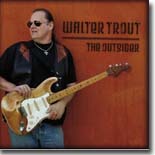 Walter Trout called me last year from Las Vegas
to advance the arrangements we had made for his
appearance here in Phoenix for Blues Blast.
We had a great conversation and Walter was in rare
form. He’d just finished recording his new record on
Provogue, The Outsider, and felt it was the
best work he’s produced to date. Now that I’ve had
the chance to really give the new record a listen, I
have to agree with Walter. The Outsider will
easily be in my top ten list at the end of the year
and it features some of the best writing and playing
that I’ve ever heard from Walter, and I own a lot of
Walter Trout records. So let’s get to it.
Walter Trout called me last year from Las Vegas
to advance the arrangements we had made for his
appearance here in Phoenix for Blues Blast.
We had a great conversation and Walter was in rare
form. He’d just finished recording his new record on
Provogue, The Outsider, and felt it was the
best work he’s produced to date. Now that I’ve had
the chance to really give the new record a listen, I
have to agree with Walter. The Outsider will
easily be in my top ten list at the end of the year
and it features some of the best writing and playing
that I’ve ever heard from Walter, and I own a lot of
Walter Trout records. So let’s get to it.
“Welcome
to the Human Race” can easily be interpreted as a
song of vindication for Walter. “Life on the road
hasn’t always been easy and Lord knows Walter’s
faced his share of challenges. Redemption doesn’t
always come easy but I believe Walter is finally now
comfortable in his own skin. “And when I find my
self…with teardrops on my face…a little voice inside
me says…welcome, welcome to the human race!” Our
next cut, “The Next Big Thing,” pays tribute to the
fact that there is always some one behind you coming
up who is bigger, faster, louder, more polished…the
next big thing. At Blues Blast, Walter
brought Sammy Avila’s son Danny on stage to play
guitar with him and Danny tore it up. Walter saw the
look of dismay on my face and just grinned. It won’t
be that many more years before Danny makes his mark
in this blues world and it won’t be long after that
before someone else will be nipping at his heels.
There comes a point in everyone’s life where they
stop and take stock of how they’ve lived. Walter
does that in “All My Life.” “All my life…all my
life…I’ve tried to do the best I can….all my life,
all my life….Lord you know that I am just a man.”
Walter has had his share of trials and tribulations
over the years, but he’s reached a point where he’s
giving us some of the best music he’s ever recorded.
I like
the footnote Walter includes as a sidebar to “The
Love Song of J. Alfred Bluesrock.” “Sincere
apologies to T.S. Eliot” speaks volumes about
Walter’s thought process in writing this tune. The
blues life is a long, hard road and everyone has
their demons. “Cut loose your cocaine and your
booze…you know you ain’t the only one…who ever had
to choose…you know you ain’t the only one…who has
ever had the blues!” The steady drum beat by Kenny
Aronoff underscores the desperation Walter feels in
“I Don’t Wanna Fall.” “I wanna get away from it
all…Lord, won’t you help me…I don’t wanna fall.”
“Child
of Another Day” features some brilliant harp work by
Jason Ricci as Walter tells the tale of several
people lost in their own lives. “Teddy was a
veteran…bumming food to eat…but as he held out his
hand…all the people turned and walked away…cuz he’s
a child of another day.” Losing your purpose…your
reason for living…makes us all children of another
day. Walter treats us next with a rare acoustic
song, “Turn Your Eyes to Heaven.” There are those
people in the world who hide behind their religion
and use it at times to justify the means, even
though they’re not always right. “It must be some
comforting…to know you’ve got it figured out…so sure
you got the answers…to what it’s all about…and never
see a shade of grey…it’s only black and white…so
turn your eyes to Heaven…He’s waiting there for
you.”
“The
Restless Age” refers to that period in everyone’s
life where they’re working hard to find their way,
to finally reach that point where they’ve made it in
world. “But now I’m on the other side…I think I made
it through…now I just enjoy the ride….what else can
I do? Oh yeah, I guess perseverance pays….so glad,
I’m so glad…I made it through the restless age.”
Walter next ponders the end of life on the road in
“Gone Too Long.” “It might be tomorrow…it might be
just up around the bend…all I know…is I’ve been gone
too long.” Real love is the topic of conversation in
the next cut, “Matter of the Heart.” Loving someone
and making it work is never easy but we all have to
try. “Love doesn’t have to be convenient…it just has
to be real…it don’t have to come easy…rollin’ like a
wheel…true love needs commitment…renewal
everyday…It’s a matter of the heart.”
Having
watched all of the political debates going on in the
country today, “You Can’t Have It All” could very
well be the anthem for this election. “The
politician's painted smile…soon begins to fade…he’s
drunk on booze and power…just like a priest who just
go laid…his façade begins to crumble…and now he
wears a frown…oh yeah, now he’s got reporters waitin’
in the hall…he didn’t realize he can never have it
all!” Power corrupts and absolute power corrupts
absolutely, Walter’s right, “you can’t have it all.”
Our next cut, “SanJay,” is indicative of that.
Sanjay Dutt is a noted Indian actor and friend of
Walter’s who was sentenced to prison unjustly for
possession of an illegal firearm. In 2007, Sanjay
was granted bail by the Indian Supreme Court. “Man,
you’re coming on home today….now the people will be
happy…because you’re coming home to stay…home to
stay this time, man!” Walter closes this great
record with the title cut, “The Outsider,” a tale
about being the odd man out, always an outsider,
never being accepted for who you are. “He’s always
felt like the outsider…standin’ on the outside
lookin’ in…all of his days…that’s just the way it’s
always been.”
The
Outsider clearly represents some of Walter’s
best work to date. His lyrics are insightful, the
playing outstanding and it just doesn’t get much
better than this. You can learn more about Walter
and his great band, the Radicals, on his website at
www.waltertrout.com. Walter is a very humble man
in person so the next time you see him play, let him
know just how much you appreciate the talents of
this great blues player who at times has always
been, “the outsider lookin’ in.”
---
Kyle Deibler
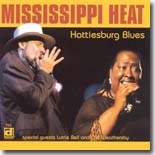 It’s
always a treat to receive a Mississippi Heat
CD in the mail to review. This band, fronted by
Pierre Lacocque, always brings their “A” game to a
recording. Their latest record, Hattiesburg Blues,
is no exception.
It’s
always a treat to receive a Mississippi Heat
CD in the mail to review. This band, fronted by
Pierre Lacocque, always brings their “A” game to a
recording. Their latest record, Hattiesburg Blues,
is no exception.
We start
out with Inetta Visor letting us know that she’s
quite happy with the “Tiger Man” in her life.
Pierre’s harp work is vibrant and his notes let us
know that Inetta is indeed a very happy woman. “When
our business is done…we lay speechless in bed…our
minds can’t think…cause we’re halfway dead…he’s my
Tiger Man!” There’s more to the story but I think
you can tell that Inetta is one satisfied woman.
Lurrie Bell takes the microphone next and is more
than happy to let us know that “Chicago is My Home.”
“Chicago is my home…and I don’t care what the
weather holds…I love this city…any which way the
wind blows!” Lurrie’s lead guitar work is straight
to the point and I think it’s great that he appears
as part of the Mississippi Heat ensemble.
Another
guitarist, Giles Corey, provides us with the soulful
introduction to “Forgot You Had a Home.” Inetta
tells us, “I’m tired of waiting around…living with
all this stress…you’re working too hard baby…you
must confess…I’m going south…I’m taking a
chance…Yes, I’m leaving you…cause you’re so damn
helpless!” Sounds like this man spent too much time
on the road and forgot just what he had at home.
It’s too late now, Inetta’s gone for good.
A
distinct Latin flavor adds character to our next
cut, “How Much Worse Can It Be.” “I got no one to
lean on…I hope someday…the sun will shine on me…I’m
tiring of sweating and a saving…how much worse can
it be?” Inetta’s on her own, working hard to stand
on her own two feet without any help and she’s
right, “how much worse can it be?” Ruben Alvarez
lends his Latin percussion talents to this cut to
give it the feel that it has.
Standing
up for herself is something that Inetta is good at
and she’s lets us know it in her rendition of Denise
LaSalle’s “Soft-Hearted Woman.” “I’ve got your bags
packed baby…you can get on out that door…you see
your soft-hearted woman…ain’t gonna be a fool no
more!” Setting this dog free was the only way that
Inetta could be happy. The addition of the Chicago
Horns provides more Latin flavor on “Hattiesburg
Blues.” Inetta’s worried that something’s not quite
with her current relationship. “Something ain’t
right with my man…you know my heart tells me…he’s
leaving me…leaving me all alone!” The only way that
Inetta will know for sure is to pack up her bags and
head on down to Hattiesburg to see what’s up with
her man.
Lurrie
lets us know that he’s on the road working hard
because times are tough and that’s the reason that
he’s been “Gone So Long.” “My body aches…miss you
more than anything…only the thought of you…kept me
from leaving…working harder has given me a heart
attack!” Lurrie can’t wait to take the train home to
see his baby and hopefully it won’t be long before
they’re reunited. “Light from Within” is an original
tune written by Inetta Visor and she’s happy to tell
us about her new love. “Have you met someone…you
could love forever? You saw the light from within
and knew you would meet again.” We’re all attracted
to those we love for different reasons, but in the
end the key is to be able to see the light from
within and appreciate the love that you’ve found.
Mississippi Heat continues to explore Latin
influences on its music with the instrumental
“Calypso In Blue.” Pierre and Giles trade harp and
guitar solos as the band gets an extended work out.
"Calypso In Blue" also features the percussion work
of Ruben Alvarez and is a nice interlude. I’ve got
visions of Salsa dancing and margarita drinking
running through my head. It’s nothing but a good
time, that’s for sure.
Carl
Weathersby has appeared on all of the Mississippi
Heat records but one since 1998 and he’s back here,
singing and playing lead on “Hell and Back.” “Yes I
know what it’s like…on the wrong side of the
tracks…believe me when I tell you…I’ve been to Hell
and back!” Carl’s definitely had some tough times
but now he’s found a good woman who is loving him
back out of the tough times. Carl’s guitar licks are
distinctive and he’s one more reason Mississippi
Heat is such a great ensemble band. Next up is the
very funky, “Say Something Good,” with Giles Corey
on guitar and vocals. “You had better say…say
something good…at least I would!” Devin Thompson is
the next guest vocalist with his performance of the
gospel influenced “Foolish Man.” “Sometimes your
body will play a dirty trick…you walk out of things
that can mess you up real quick…I fell for another
girl…I took the darn bait…now my mind’s in a
whirl…and I’m going back to my wife…treat her the
best I can…those are the days…those are the days…of
being a foolish man!” Saying no to temptation is not
one of Devin’s strengths, that’s for sure.
Hattiesburg Blues closes with a tribute to Al
Gore’s ecological work, “Nature is Cryin.” “The
ozone layer is ending…creating a real bad tear…we’re
living in hell…but no one seems to care…our waters
need a clean up…its all falling apart…we ain’t got
time to spare!” Ecologically we all need to do our
part to keep this planet a better place to live for
our children and our children’s children.
This has
been a very good listen and a very warm record by
Mississippi Heat in the sense that it’s upbeat and
positive. I find it interesting that Pierre has
written 10 of the 12 tracks on the record and never
sang a lead on the entire CD. It’s a testament to
his vision of Mississippi Heat that the sum of the
parts remains greater than the whole, and all of the
players involved function so well as a unit. To find
out more about this great Chicago Blues Band, visit
their website at
www.mississippiheat.net.
---
Kyle Deibler
 Here, at
last, is Storm Warning's follow up to the
hugely popular 2006 album, Breaking Out. It’s
been worth the wait – Something Real (Lightnin'
Fingers Records) is even better than Breaking Out,
and that’s no mean feat!
Here, at
last, is Storm Warning's follow up to the
hugely popular 2006 album, Breaking Out. It’s
been worth the wait – Something Real (Lightnin'
Fingers Records) is even better than Breaking Out,
and that’s no mean feat!
The
album comprises nine tracks, eight of them original,
and opens with the moody intro to “On The Road,” a
track that really sets the scene for this CD. Son
Maxwell blows some very atmospheric harmonica before
taking the vocals on this driving blues track.
The
album moves on to “Hard To Be A Man”, the tempo
picking up a bit and a steady bass line pushing the
band forward into a boogie beat that gets your feet
tapping for the whole of the track.
“Charlie’s Blues” once again shows off the harmonica
of vocalist Son Maxwell, with the tempo stepped down
ever so slightly from the previous track, and some
keyboards way in the background from Ian Salisbury.
“Blues 101” makes reference to just about every
well-known blues track you’ve ever heard – this is a
very cleverly written track and Maxwell gets some
real dirty blues sounds out of his harmonica, with
great solo work over a percussive bass line. At
times, there’s a jazzy feel to this track as it
switches and moves through the instrumental section,
and it really holds the listener’s attention –
certainly a contender for the best track on the CD.
“Something Real” slows down the pace to ballad speed
and gives you a chance to get your breath and give
your feet a rest – this track sound like something
that Gary Moore might include in his repertoire.
Next up is “One Step Forward,” which sets a trap for
the unwary listener – there’s a gentle intro that
suddenly erupts into an up-tempo driving beat – Ian
Salisbury finally comes into his own and provides
some fantastic keyboard work, alongside the burning
guitar of Bob Moore. Another contender for the best
track!
Things
slow down again with the only cover version on the
album – Lucky Peterson’s “Nothing But Smoke.” This
is a great version of a great track, and I fell in
love with it straight away – excellent late night
blues, without a doubt.
Ths CD
closes out with a boogie beat, “I Don’t Know,”
followed by a slower “Long Ride.”
Something Real is a superb follow up album and
one that is well worth adding to any blues
collection.
---
Terry Clear
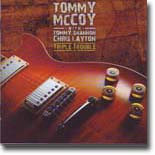 Tommy
McCoy’s Triple Trouble (Blues Boulevard)
is an excellent CD from a man who moved from Ohio to
Florida and opened a record store in the late 1970s
– he also started a blues band, The Backdoor Blues
Band, which later became the Screamin’ Bluejays. He
then joined The Telephone Kings with some former
members of the Gregg Allman Band.
Tommy
McCoy’s Triple Trouble (Blues Boulevard)
is an excellent CD from a man who moved from Ohio to
Florida and opened a record store in the late 1970s
– he also started a blues band, The Backdoor Blues
Band, which later became the Screamin’ Bluejays. He
then joined The Telephone Kings with some former
members of the Gregg Allman Band.
Along
the way he struck up a friendship with the late
Stevie Ray Vaughan, and later went to Austin, Texas
to record most of the tracks for this album with
Chris Layton and Tommy Shannon – familiar to Stevie
Ray Vaughan fans as Double Trouble.
As you
can tell from above, this man has a good grounding
in the blues, and it shows through in this album,
which was recorded in the late 1990s and has just
been released on the Blues Boulevard label. McCoy,
Layton and Shannon form the core of the band, and
they are joined by a host of guest musicians to
produce 13 excellent tracks, most of which were
written by Tommy McCoy. One notable exception is
Roger Waters’ “Money,” given a very different
treatment here, and not to be confused with the
Berry Gordy version, which is the following track on
the CD! Coincidentally, there are also other tracks
with money in the title – “Love ‘n’ Money,” “She
Worships Money,” and a couple that relate to it –
“Poverty” and “Broke You’re A Joke” – maybe there’s
a message here somewhere?
The
album opens with the excellent McCoy-written “No
Love Without Any Green,” a good up-tempo driving
blues which really gets the listener into the mood
for some more. Track two slows right down to ballad
speed for “It’s These Blues,” another McCoy
original, and the lovely instrumental “Love ‘n’
Money” comes up as track three. This is slow, moody,
atmospheric, late night blues at its best.
From
there throughout the rest of the album is a mix of
tempos and styles which complete a very buyable CD –
best of the bunch, and certainly the bluesiest, is
track nine, “Con Man,” a real gem!
---
Terry Clear
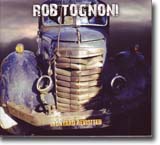 Ironyard Revisited (Boulevard Blues) is hard
hitting blues rock from Australian guitarist Rob
Tognoni, and it takes no prisoners. If you like
blues rock, then you’ll probably love this, but if
you’re a blues purist then you’re best to leave it
well alone.
Ironyard Revisited (Boulevard Blues) is hard
hitting blues rock from Australian guitarist Rob
Tognoni, and it takes no prisoners. If you like
blues rock, then you’ll probably love this, but if
you’re a blues purist then you’re best to leave it
well alone.
On a
purely technical basis, this is good guitar playing
backed by a band that knows it’s stuff and musically
it can’t really be criticized – it’s just that it’s
more rock than blues. Having said that, there is
some blues mixed in, and when it comes to the
surface it’s good.
The
album opens with a hard rocker, “Words Of A
Desperate Man,” which sounds a bit like AC/DC plays
the blues and it’s certainly catchy, leading into
track two and getting just a little bit bluesier and
slower, with “No Guarantee.” By the time that the
old Hound Dog Taylor track “See Me In The Evening”
(track three) comes in, there’s some blues reaching
the surface and the tempo is picking up nicely.
Tognoni makes a good job of this track and shows
that he does, actually, know how the blues should be
played.
Track
four, “Shoot, Hoot, Electrocute,” is another rocker,
but the following track, “The Ironyard,” is a
beautiful instrumental blues. It’s very atmospheric,
well-written, well-played, Gary Moore-influenced,
pure blues.
Of the
other tracks on the album, “Devil Outa Me” is a good
rocking blues number, there’s a reasonably good
version of “Hey Joe” and another track which sounds
heavily influenced by Gary Moore, “Crossword Blues.”
The CD wraps up with a lovely instrumental blues
called “The Good Die Young.”
All in
all, if you’re a rocker you’ll probably like the
album, if you’re into good blues then you’ll
probably listen to three tracks. Rob Tognoni can
play the blues, so why doesn’t he just bring out a
blues album?
---
Terry Clear
 I have
to admit to never having heard of Paul Reddick
before this CD, Sugar Bird (NorthernBlues),
reached me, but having listened to this album I’m
certainly glad I’ve heard of him now. This CD is so
refreshing and original that, initially, it’s
difficult to get into what this artist is about.
But, if you persevere with it, the music grows on
you very rapidly.
I have
to admit to never having heard of Paul Reddick
before this CD, Sugar Bird (NorthernBlues),
reached me, but having listened to this album I’m
certainly glad I’ve heard of him now. This CD is so
refreshing and original that, initially, it’s
difficult to get into what this artist is about.
But, if you persevere with it, the music grows on
you very rapidly.
His
publicity describes him as “poet laureate of the
blues” and he is definitely a poet and a bluesman,
so I guess that the description is about accurate.
The influences that Reddick quotes come through in
the music and in the songwriting – John Estes, Fred
McDowell (he quotes some poets, too, but I’m not
great into poetry so I can’t comment!), but there is
great originality, too.
This is
a CD that should be listened to a few times, maybe
through headphones, to get the full benefit of the
music (and, I guess, the poetry, too). The album was
produced by Colin Linden, and he appears on guitar
too, so the pedigree is established.
The CD
opens with “Morning Bell,” with some very Fred
McDowell guitar work – and once you’ve listened to
this track, you’re hooked on this guy’s music. “I
Will Vanish” then slows things down a little, before
letting “Devilment” pick up the pace again, but a
bit of a boogie beat on the guitar.
From there on the tempo alternates between ballad
and medium pace blues, but never really gets hectic,
and that’s the magic of this album – it’s so laid
back, it catches you unaware.
The CD
rounds out with maybe the bluesiest track on it –
“Block Of Wood,” with Reddick blowing some great
harmonica – no doubt about it, this is my favourite
track on the CD!
---
Terry Clear
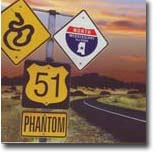 Belgian
label Blues Boulevard continue their good work with
this re-release of the 2001 album, 51 Phantom,
by those well-known blues rockers, The North
Mississippi Allstars. This album was the follow
up to the widely acclaimed Shake Hands With
Shorty and if, like me, you missed this one the
first time around, then you can take advantage of
the hard work of Blues Boulevard and get your hands
on it easily now.
Belgian
label Blues Boulevard continue their good work with
this re-release of the 2001 album, 51 Phantom,
by those well-known blues rockers, The North
Mississippi Allstars. This album was the follow
up to the widely acclaimed Shake Hands With
Shorty and if, like me, you missed this one the
first time around, then you can take advantage of
the hard work of Blues Boulevard and get your hands
on it easily now.
The
album opens with the title track “51 Phantom,” a
punchy blues boogie with some great slide guitar
work and a pounding back beat that just gets your
feet tapping in time with the drum beats, and your
soul wanting more. And more is what you get as the
CD slides into “Snakes In My Bushes” and then into “Sugartown.”
Things
start to slow down enough for you to catch your
breath with “Lord Have Mercy,” a Junior Kimbrough
track, and then a little slower still with “Storm” –
but then things start to pick up again with the
superb Pops Staples song, “Freedom Highway,” only to
morph into the slow, purposeful, “Circle In The
Sky.”
Track
eight, “Ship,” is a blues gospel number, with heavy
Mississippi influence – something totally different
and unusual - and it works so well! It’s followed by
the gentle "Leavin’," a track that haunts you as you
listen to it – lovely lyrics and a relaxing rhythm.
Apart from “Lord Have Mercy” and “Freedom Highway”,
all of the other tracks are written by the band.
Some
people have compared this band to ZZ Top, but they
deserve to be looked as as totally individual, and
they deserve to be listened to.
---
Terry Clear
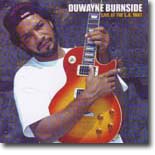 Duwayne Burnside is a man who nobody can dispute
has the blues in his blood – he’s the son of the
late, great, R.L.Burnside, and Mississippi hill
country blues is in him through and through.
Duwayne Burnside is a man who nobody can dispute
has the blues in his blood – he’s the son of the
late, great, R.L.Burnside, and Mississippi hill
country blues is in him through and through.
Live
at the LA Mint (Blues Boulevard) was recorded in
Los Angeles in 1998, before R.L.Burnside sadly
passed away, and he features on it along with the
young Cedric Burnside and David Kimbrough Jr.,
another name that will be familiar to fans of
Mississippi blues.
There
are a mixture of blues standards, such as “Dust My
Broom,” “Crosscut Saw” and “Hoochie Coochie Man,”
and some R.L.Burnside originals like “Well Well
Well.” Altogether, the nine tracks featured on the
album make up a good solid blues mix, with some
great atmosphere thrown in by the fact that it is a
live recording.
The
album opens with an intro to the live audience and a
lovely long version of “Bad Bad Pain” before moving
into “Woman You Must Be Crazy” – this young man
doesn’t only look like his father, he sounds like
him and plays like him too!
The
version of “Crosscut Saw” is an absolute beauty,
with some excellent guitar work and “Dust My Broom”
is the best version that I’ve heard for a long, long
time.
This is
a great album to have in any blues collection – even
more so if you are a fan of the late R.L.Burnside,
because his son keeps the blues alive.
---
Terry Clear